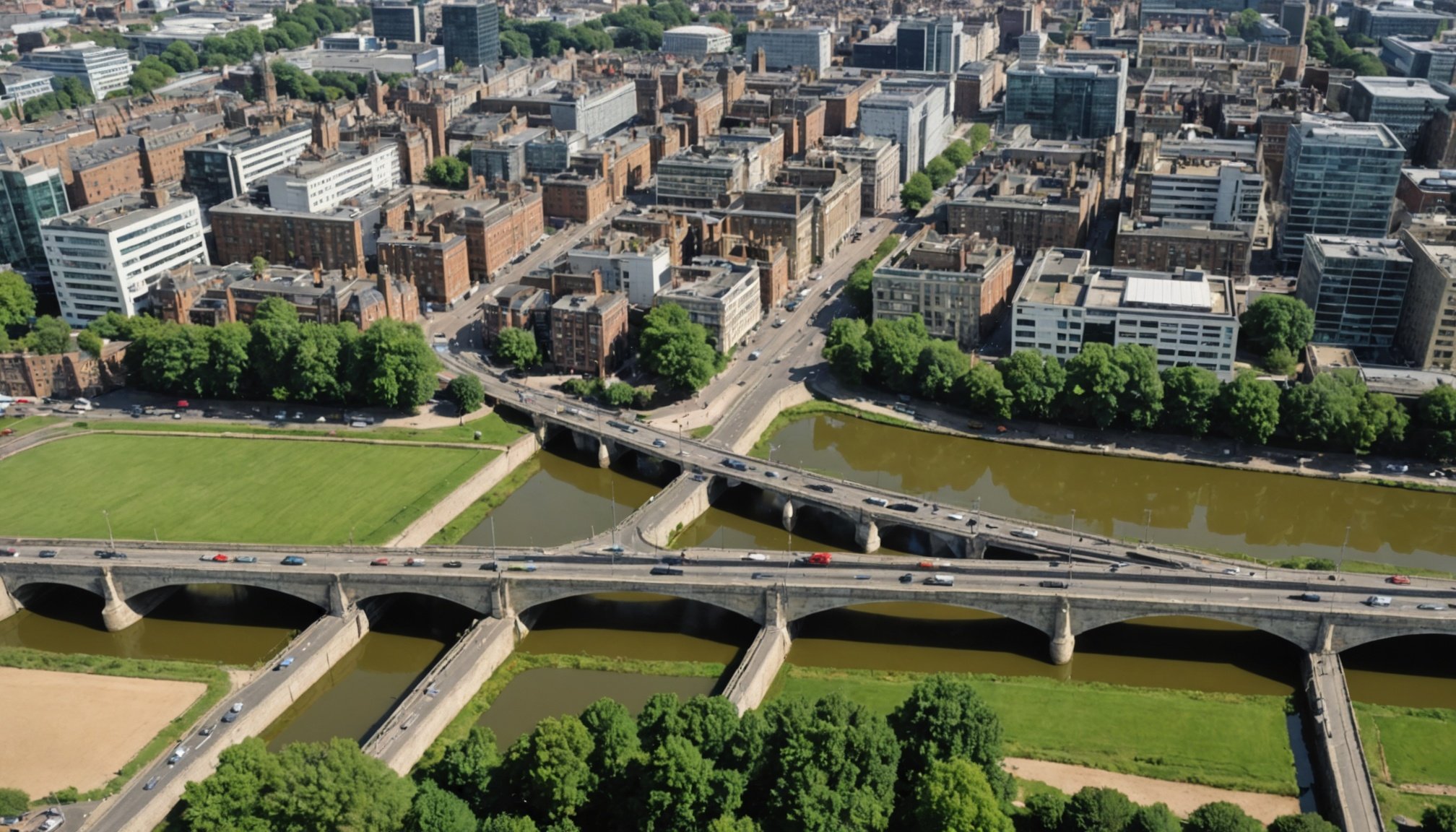Transforming Urban Drought Resilience: How Smart Water Management Systems Are Shaping UK Cities
As the UK faces the dual challenges of a growing population and the impacts of climate change, the need for innovative and sustainable water management strategies has never been more pressing. Urban areas, in particular, are at the forefront of this transformation, with smart water management systems playing a crucial role in enhancing drought resilience and ensuring a secure water supply for the future.
The Imperative of Smart Water Management
In the context of urban development, smart water management is not just a luxury but a necessity. The National Infrastructure Commission highlights that nearly one million homes in the UK have more than a 1% chance of flooding in any given year, and there is a one in four chance of a severe drought before 2050[4].
In the same genre : Building a resilient cybersecurity strategy for uk public sector organizations
“Addressing challenges like climate change, water security and aging infrastructure, managing this essential resource has never been more complex for the water sector,” notes Kate Kenny, Senior Vice President at Jacobs[3].
To mitigate these risks, water companies are investing heavily in cutting-edge technologies and infrastructure. For instance, Severn Trent is investing millions to enhance water resilience, reduce carbon emissions, and improve service quality. This includes the innovative Witches Oak Water Treatment Works project, which utilizes floating wetlands as natural filters to clean water before it reaches the treatment works, thereby reducing the need for energy and chemicals[1].
This might interest you : Elevating career opportunities: how the uk”s digital literacy program is transforming employment prospects
Leveraging Advanced Technologies
Advanced analytics and AI are game-changers in modern water management. These technologies provide granular insights into water usage, flow, safety, and wastage, enabling stakeholders to make informed decisions.
Predictive Maintenance and Real-Time Monitoring
Predictive AI allows utilities to identify potential weak points in their networks, prioritize maintenance efforts, and prevent failures before they occur. For example, Arcadis’ partnership with the San Antonio Water System in the US involved implementing an AI-driven asset management system that analyzed variables such as pipe material, age, and environmental conditions to predict failure risks. This proactive approach helps prevent costly disruptions and reduce water loss[5].
In the UK, Jacobs is working with United Utilities to provide water network and water quality modeling services using advanced modeling techniques and AI-driven predictive analytics. This collaboration is part of United Utilities’ largest water and wastewater infrastructure investment in North West England in a century, serving approximately seven million people[3].
Data-Driven Decision Making
Data collection and analysis are crucial components of smart water management. The 50L Home Coalition, for instance, is piloting innovations in London homes to reduce daily household water use to just 50 litres per person, far below the current UK average of 145 litres. Preliminary results from a similar project in Los Angeles showed a 19% reduction in total indoor water usage and a 24% reduction compared to a control group[2].
Smart Meters and Leak Detection
The installation of smart water meters is another key strategy. Severn Trent has installed over 100,000 smart meters, which help customers understand their consumption and identify potential leaks. This data has enabled the company to fix a large number of leaks and provide customers with tips on reducing their water usage, thereby saving money[1].
Here are some ways data-driven tools are transforming urban water management:
- Granular Insights: Providing detailed information on water usage, flow, and wastage on an appliance-by-appliance basis.
- Real-Time Alerts: Sending immediate notifications for leaks and excessive consumption to empower homeowners to take action.
- Predictive Analytics: Modeling water distribution systems to predict demand fluctuations and optimize resource allocation.
- Behavioral Changes: Encouraging water-saving habits through public awareness campaigns and community-driven initiatives.
Sustainable Urban Development
Sustainable water management is closely tied to urban development and environmental policy. The Water-Energy-Carbon (WEC) nexus highlights the interconnection between water consumption, energy use, and carbon emissions. Reducing water waste can directly impact energy savings and carbon reduction, which is critical for advancing net-zero goals[2].
Environmental Improvements
Severn Trent’s Water Industry National Environment Programme (WINEP) is a prime example of sustainable urban development. The program includes trialing innovative solutions such as reactive media reedbeds, improving river water quality, and moving two stretches of river towards bathing quality. Additionally, the company is installing thousands of new smart water meters and trialing sustainable urban drainage systems to improve flooding resilience[1].
Here is a comparison of some key initiatives in sustainable urban water management:
| Initiative | Description | Impact |
|---|---|---|
| Witches Oak Water Treatment Works | Using floating wetlands as natural filters | Reduced energy and chemical use |
| Smart Water Meters | Providing real-time consumption data | Identified and fixed leaks, reduced consumption |
| WINEP Programme | Trialing reactive media reedbeds and improving river quality | Enhanced environmental performance |
| Sustainable Urban Drainage Systems | Implementing permeable paving and detention basins | Improved flooding resilience |
Policy and Collaboration
Effective smart water management requires a multifaceted approach involving collaboration between individuals, businesses, researchers, and governments. Policy plays a crucial role in incentivizing the adoption of smart technologies and enforcing regulations that prioritize water conservation.
Government Initiatives
The National Infrastructure Commission advises that government and Ofwat, the regulator, should ensure plans are in place to deliver additional water supply and demand reduction. This includes investing in new transfer and storage infrastructure and stricter controls on new developments connecting to existing drainage systems[4].
“Our new network modeling collaboration will help us make informed decisions across operations and capital investment programs by monitoring rivers, catchment land, and coastal infrastructure to see where we can improve our services and meet supply needs of the future,” said Jane Simpson, Capital Delivery Director at United Utilities[3].
Community Engagement and Behavioral Change
Public awareness campaigns and community-driven initiatives are vital for encouraging water-saving habits. By providing people with actionable data on their consumption, we can empower them to become active participants in water conservation.
Practical Advice for Homeowners
Here are some practical tips for homeowners to contribute to smart water management:
- Fix Leaks Promptly: Leaks can waste significant amounts of water. Using smart leak detectors can help identify and fix leaks quickly.
- Use Water-Efficient Appliances: Installing water-efficient fixtures and appliances can reduce overall water consumption.
- Monitor Consumption: Use smart meters to track water usage and receive real-time alerts for excessive consumption.
- Support Community Initiatives: Participate in local water-saving initiatives and support policies that promote sustainable water use.
The Way Forward: A Collaborative Effort
Sustainable water management in urban areas is a collective responsibility. It requires the active participation of individuals, businesses, and governments.
Long-Term Planning and Adaptation
The UK’s water sector is embarking on significant long-term investments to ensure resilient water services. For example, Severn Trent’s plan includes an almost £7 billion investment in wastewater treatment and a £550 million financial support package to help customers pay their bills[1].
“Managing this essential resource has never been more complex for the water sector,” emphasizes Kate Kenny. “Our global water infrastructure solutions and our 20+ years’ experience working in the region will support United Utilities’ largest ever program to advance environmental performance and resilient water services across the region”[3].
In conclusion, transforming urban drought resilience through smart water management is a multifaceted endeavor that involves advanced technologies, data-driven decision making, sustainable urban development, and collaborative policy efforts. As the UK continues to face the challenges of climate change and population growth, these innovative strategies will be pivotal in ensuring a secure, sustainable, and resilient water supply for future generations.

